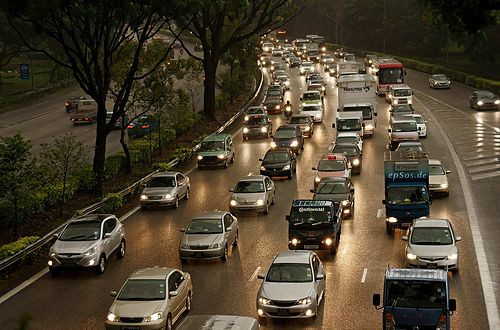Want To Know The Secret To Happiness? 'Don’t Commute,' Says Survey; Longer Travel Times Linked To Back, Neck Pain And Less Sleep

Drinking your daily coffee might be a necessary ritual in your morning routine, but it might only be making you more alert to how unhappy you are. Shorter commutes have been labeled the "secret to happiness," as they lead to a host of related morale boosters, a recent survey discovered.
A survey conducted for the Gallup-Healthways Well-Being Index showed 40 percent of people with total commutes of three hours or more "experience worry" for most of the day. This data, alongside other such findings, contribute to the overall conclusion that less time spent strengthening social relationships can ultimately lead to a serious reduction in health and happiness.
The 40 percent experiencing worry contrasts with 28 percent of people feeling worried when their commute is 10 minutes or less. A third of people, 33 percent, reported chronic neck or back pain with a commute to work of 90 to 120 minutes. When asked to rank their enjoyment of daily activities, morning commutes ranked dead last.
The findings also suggest that longer commutes correlate highly with greater divorce rates, obesity levels, decreased exercise, and increased consumption of fast food.
Research for the survey was collected through telephone interviews with 173,581 employed adults, between July 1, 2009 and June 30, 2010.
Measuring people's levels of happiness poses certain difficulties for scientists, some being procedural and others theoretical. The Index concedes, for example, that natural reporting biases may occur through their sampling.
"In addition to sampling error, question wording and practical difficulties in conducting surveys can introduce error or bias into the findings of public opinion polls," the report states.
People may have an imperfect memory of how happy or unhappy their commute makes them, so they may report skewed information. This type of bias represents a more theoretical problem with studying commute times related to happiness, notes behavioral economist Daniel Kahneman, as he divides happiness into two distinct selves: the experiencing self and the remembering self.
The experiencing self lives in the "now," interacting with the moment-to-moment sensations as they come in real-time. The remembering self stores those moments for later, to tell a story once the moment has passed.
"From the point of view of the experiencing self, if you have a vacation, and the second week is just as good as the first, then the two-week vacation is twice as good as the one-week vacation," Kahneman says. "That's not the way it works at all for the remembering self. For the remembering self, a two-week vacation is barely better than the one-week vacation because there are no new memories added. You have not changed the story."
The person with a three-hour commute roundtrip may indeed be unhappier during the commute, but he may form happier memories than his experiences lead him to believe. The chronic neck pain and rising obesity rates, however, seem to imply both selves fall victim to a longer commute.
The Index recommends employers use this data to alter their telecommuting practices, which it believes will ultimately boost employee morale, and thus, productivity.
"Employers should also recognize that it's not just the time lost in commuting that may have adverse effects. Particularly in tough economic times, commuting expenses - whether they go to gas and parking or mass transit fees - may contribute to elevated worry levels," the report states. "Helping defray those costs may help employees make the long trek to and from work with greater peace of mind."



























